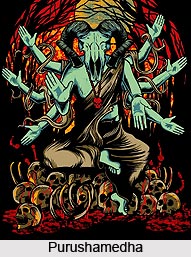 Purushamedha is a yagna described in the Yajur Veda. The Purushamedha was a ritual in which a human being was sacrificed instead of a horse as in the Asvamedha Yajnya. The ceremonies performed were very similar in the two cases. Just as the horse was let loose for about a year, the human victim was allowed to enjoy himself for the same period, during which all his wishes were satisfied. People from all classes and of all descriptions tied to a wooden stake (cross) and offered to Prajapati. Prajapati literally means Lord of Hosts. This re-enacts the creation of a new class of people dedicated to Prajapati.
Purushamedha is a yagna described in the Yajur Veda. The Purushamedha was a ritual in which a human being was sacrificed instead of a horse as in the Asvamedha Yajnya. The ceremonies performed were very similar in the two cases. Just as the horse was let loose for about a year, the human victim was allowed to enjoy himself for the same period, during which all his wishes were satisfied. People from all classes and of all descriptions tied to a wooden stake (cross) and offered to Prajapati. Prajapati literally means Lord of Hosts. This re-enacts the creation of a new class of people dedicated to Prajapati.
The Purusha Sukta describes the process of creation of man from the cosmic Purusha (Person of Isa) who is described as a human. The Purusha Medha is an enactment of the sacrifice of Isa. Purusha leads to creation and recreation. The ceremony evokes the mythical sacrifice of Purusha, the `Cosmic Man.` The officiating Brahman recites the Purusha sukta indicating the continuous process of recreation of man in Isa.
The sacrifice of the creator himself in order to give life to the people and his resurrection are symbolized in most of these Levitical type rituals. It is at the end of these we have the Isa Upanishad! It is written in poetry form indicating that it was supposed to be taught and memorized through generations. Scholars agree that this Upanishad mark the beginning of Monotheism in the Upanishads - hence its importance in the History of Indian.













